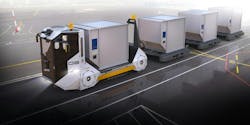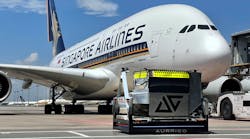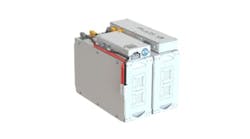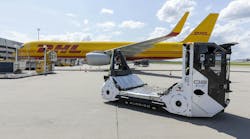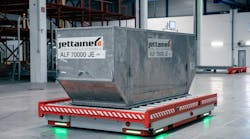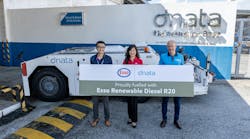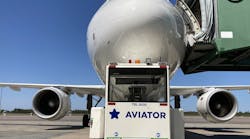Aurrigo International PLC has secured a contract with the Digital Testbed Cargo Project (DTAC) Consortium to trial the autonomous transport of cargo from the terminal to the deck of the aircraft. The program will use an Aurrigo Auto-DollyTug autonomous, electric vehicle, which brings unprecedented maneuverability and utility to the aviation sector to improve efficiency and speed up aircraft turnaround times.
The subproject, which is funded by the Germany Federal Ministry of Digital and Transport (BMDV) and is carried out under the academic leadership of the Frauhofer IML (Institute for Material Flow and Logistics) and the Frankfurt University of Applied Science is part of the Digital Testbed Air Cargo (DTAC) project. The preparation work has already begun with Auto-DollyTug expected on the tarmac in March 2024.
Auto-DollyTug combines the utility of a baggage /cargo tractor, with the ULD carrying capability of an airport dolly, making a more flexible and space efficient vehicle. This means that a combination of an Auto-DollyTug and three trailers carries four ULDs or over 30 percent more than a traditional tug set-up of the same overall length. Auto-DollyTug incorporates robotic arms on the body, allowing the vehicle to autonomously load and unload a ULD itself.
“We are absolutely delighted to win this first deployment in Germany, following on from announcements we have made already in Singapore, USA, and the UK. This is an endorsement of our strategy to concentrate on aviation, a sector where there is a clear demand for autonomous, electric vehicles to reduce emissions, improve efficiency and allow for continued growth in volumes, despite a shortage of security cleared ground staff,” said Aurrigo CEO David Keene.
The operational part of the project is for an initial four week period at the project test site in Stuttgart Airport, which is expected to start in March 2024. The German project follows on from successful testing at Changi Airport in Singapore with the Auto-DollyTug, which has been running since February 2022.
